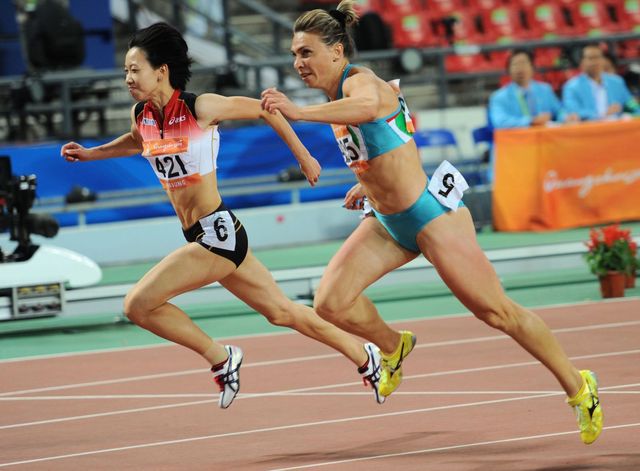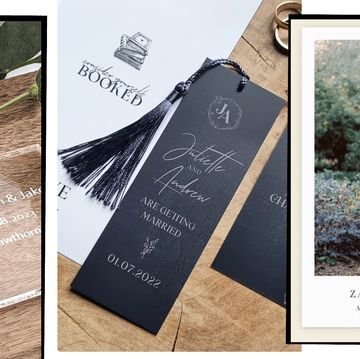In the countdown to the 2016 Olympic Games in Rio, we go inside the mind of female athletes to understand what it takes to win and how we can all harness the power of positive thinking.
Dakota Ditcheva is blonde, beautiful and 17 years old. She is also a three-time world champion in the combat sport of Muay Thai fighting. When Ditcheva first started competing at the age of 13, there were some who found it difficult to reconcile these two things. How could a pretty teenage girl also be capable of coolly knocking out an opponent with perfectly timed kicks and punches?
'I had a few people online saying, "Women can't be as good as men. They aren't as strong."' Ditcheva recalls. 'Daft comments.' Her response was not to feel upset or undermined. In fact, she simply refused to engage. She ignored the negative feelings the comments generated and instead started visualising her next win. Losing, Ditcheva told herself, was not an option. Each time she felt an inkling of self-doubt, she switched it off and replaced it with a mental image of success. She saw herself landing a winning kick and flooring her opponent.
Then she got in the ring and won her next fight. And the next one. And the one after that. To this day, Ditcheva is undefeated and being touted as Britain's Ronda Rousey, the American mixed-martial arts champion and former Olympian who is the most popular sportswoman on social media, with 2.24 million Twitter followers. 'That's how I prove them wrong,' Ditcheva says. 'Watch me perform, and I'll show you the way.'
Even for the rest of us non-professional athletes, motivation and inspiration have become the new buzzwords. In an age where friendships are conducted on WhatsApp and our conversations take place on Facebook, and where the first thing many of us do when we wake up is check our smartphones, we're yearning for something more tangible, more physical. When so much of our life is mediated through a computer screen, we want to reconnect with our bodies. On Instagram, @thegoodquote, an account that posts such mottos as, 'Be A Warrior, Not A Worrier', has attracted 8.3 million followers (and rising).
But there's a difference between a slogan and success. To become an athlete, those words must be distilled into action. It's the kind of achievement that requires a very particular mindset. A refusal to even consider anything but being the best. Natural athletic ability is one thing. It's innate and, of course, demands dedicated training – but a winning mental attitude can be taught and honed. Strength can be maximised and reinforced with the right perspective and bullish positivity. Anyone can change their thinking with the right tools and approach. An elite sportswoman needs physical power but their training starts on a psychological level, instilling key attributes such as endurance, resilience and focus before they even get to the starting blocks. So what does it take to compete at the highest levels of sport? And can we all apply the lessons these women learn to our everyday life?
According to Penny Mallory, a performance coach and an expert in the psychology of success, the mindset of a female athlete is founded on two key attributes: experience and focus. The more experience an athlete has at competing, the more able they are. Ability is 'something you earn, like trust. Experience gives you confidence and confidence gives you the passport to succeed'.
In athletics, as in life, a female mindset can also differ from a male one. Women are, generally speaking, more able to talk about their ambitions but also more in danger of turning their negativity inwards. 'All my female clients are a lot more vocal about their goals, achievements, bodies and appearance,' says Delle Allen, a personal trainer and professional dancer. 'I can list each individual, self-diagnosed "problem area" on all my female clients and there is often a critical analysis of the bad health choices made that week, and then a list of reasons why they feel guilty about them. I never experience this mental analysis with my male clients – though that is not to say they aren't thinking about them.'
A female athlete therefore needs to be able to visualise positive outcomes rather than negative ones. 'Imagination is visualisation which is linked to desire,' Mallory explains. 'If you see a beautiful house and you can't imagine yourself living there, and you say, "No, no, it's not for me," then the chances are you're highly unlikely to end up living there. The same goes with winning at sport. Mostly people are led by their environment. If you don't grow up in a family of athletes or you have people around you saying you can't, it takes a strong personality or something extraordinary happening in someone's life for them to think, "Screw it, I'm doing it anyway."'
Not many of us will be able to compete on a physical level with elite athletes, but we can all benefit from positive visualisation. Just as vivid imagery helps an athlete to prepare mentally – by improving their confidence, clarity and speed of thought – so it can help the rest of us prepare for a big business presentation or a public speaking engagement. And that's not just wishful thinking. A study conducted by the Cleveland Clinic Foundation in Ohio found that participants who visualised weight-training success actually increased their muscle strength by 13.5%.
After a frustrating losing streak, tennis champion Andy Murray hired a sports psychologist to be part of his coaching team. In the run up to his 2013 Wimbledon win, Murray made several visits to a deserted Centre Court in Wimbledon in order to mentally acclimatise to the environment. According to sports psychologist Dr Steve Bull, author of The Game Plan: Your Guide To Mental Toughness At Work (Capstone): 'There is a huge crossover between the demands of sport and business. For example, if you visualise a big business presentation in real detail, you will prepare for everything from your best posture and body language, and how you will handle any feelings of anxiety, to the awkward questions that might be asked and how you will respond to them. By the time you walk in there, you will feel much more confident.'
The sportswomen I speak to all have one thing in common: they will not conceive of losing. Traditionally, that kind of self-belief has been judged as aggressive and anti-feminine. In everyday life, women are not encouraged › to put themselves out there, to compete and to have unwavering self-belief. Today's female athletes have no truck with that kind of gendered thinking. For Danielle Burt, that kind of mindset became a matter of life or death when she had a motorbike accident at the age of 19. While riding her bike in San Diego in 2004, she lost control and was thrown 45ft down the side of a mountain.
Burt fractured her neck, broke all her ribs, ruptured her spleen, and smashed the tibia and fibula on her right leg. She was in a medically induced coma for five weeks, during which doctors had to amputate her leg above the knee. When she finally left hospital, she felt her life was over. 'I was scared, depressed and angry,' Burt says. 'I realised everything was different. I lost my apartment, my job and my body was something I didn't recognise anymore. Physically, I could see what had happened, but it got to the point where I realised if I didn't figure out the mental side of things, that would be my biggest barrier.'
Burt went for Cognitive Behavioural Therapy (CBT) and slowly rebuilt her confidence. Around the same point, she became friends with some surfers and decided to try something new. There were no surf-specific prosthetic limbs available at the time; for Burt, the challenge spurred her on. She didn't like being told something wasn't possible, least of all by her own inner critic – that the negative, self-defeating voice had taunted her after her accident: 'It pushed me to prove these people – and myself – wrong.'
Today, at the age of 31, Burt is the world's first above-the-knee amputee surfer. Last year, she placed first among women at the International Surfing Association's Adaptive World Surfing Championships. What does she think is the most important key to developing an athlete's vision? 'Staying calm is definitely the biggest thing: you can't panic.' Practically, this means she is 'always prepared. I always need to be early and I get my gear together the night before. It's important for me to limit anything that can cause stress or anxiety.'
Burt says that the ocean can be a stressful place. When a wave takes you under, you have to give yourself over to it and let it pass. It is a metaphor for how she lives her daily life. She used to get enraged when stuck in traffic. These days, she finds it easier to keep calm and to let the necessary time pass until it clears. Ditcheva, too, was able to take what she had learned competing into her attitude to schoolwork. 'I'm not the most academic person and I used to stress about my school work,' she says. 'In my GCSEs, positive visualisation really helped. All I thought about was getting Cs and above. I never even thought of a D. I got 13 GCSEs and they were all grade C and above.'
According to Jim Taylor, a professor at the University of San Francisco, one of the ways to alleviate the negative impact of nervousness 'is to expect to be nervous. If you anticipate experiencing some anxiety, when it arises, your reaction will be, "This is normal. I knew I would get a little nervous. No big deal." If you view anxiety as negative and threatening, it will clearly hurt your play. If you see it, instead, as an indication that you're getting yourself prepared for the big game, that the feeling is not anxiety but rather excitement, then you will see it much more positively.'
Many of us turn to sport and exercise at times of personal stress or crisis. After a particularly challenging time in my life, which involved unsuccessful fertility treatment, miscarriage and a relationship breakdown, I found myself overcome with the urge to run. I had always previously thought of running as the devil's exercise and barely managed 10 minutes before panting and sweating, and asking myself why on earth anyone bothered with such a horrible pasttime.
But when I took it up last year, I bought myself a proper pair of trainers and devised a kick-ass playlist to get me through the first 20 minutes, and I found I loved it. More than that: I needed it. And I think, looking back, it's because I wanted my body to reassert itself. On one level, it had failed to do what it was meant to do – conceive – but I could make myself strong in a different way. I could propel myself with my own strength. I could rebuild my confidence by relying on nothing other than my physical ability and my capacity to think I could do it. I was employing positive visualisation without even realising it.
As empowered women, we need to take control where we can. That means believing we can achieve. That means reclaiming our physical strength. That starts with our bodies. That starts with us.
How To Win Every Day, From The Female Athletes Who Know How
Be prepared
Make sure you have plenty of time, whether it's leading up to a race or a big meeting. Get your 'kit' together the night before so you don't have to worry about it on the day. By eliminating unnecessary stress, you can focus on the things that count and aremore likely to succeed.
Stay calm
Remember that the person you are up against is probably feeling the same doubts, anxieties and emotions as you. Whatever you're feeling, you can win the mental game by keeping your nerve.
Recover quickly
Loss of confidence will hurt your play far more than the mistakes themselves. After a mistake, go into attack – rather than surrender – mode. In practical terms, this could involve creating a keyword like 'attack', 'charge', or 'go', that you can say to yourself that will help you back on your feet.
Words by Elizabeth Day













